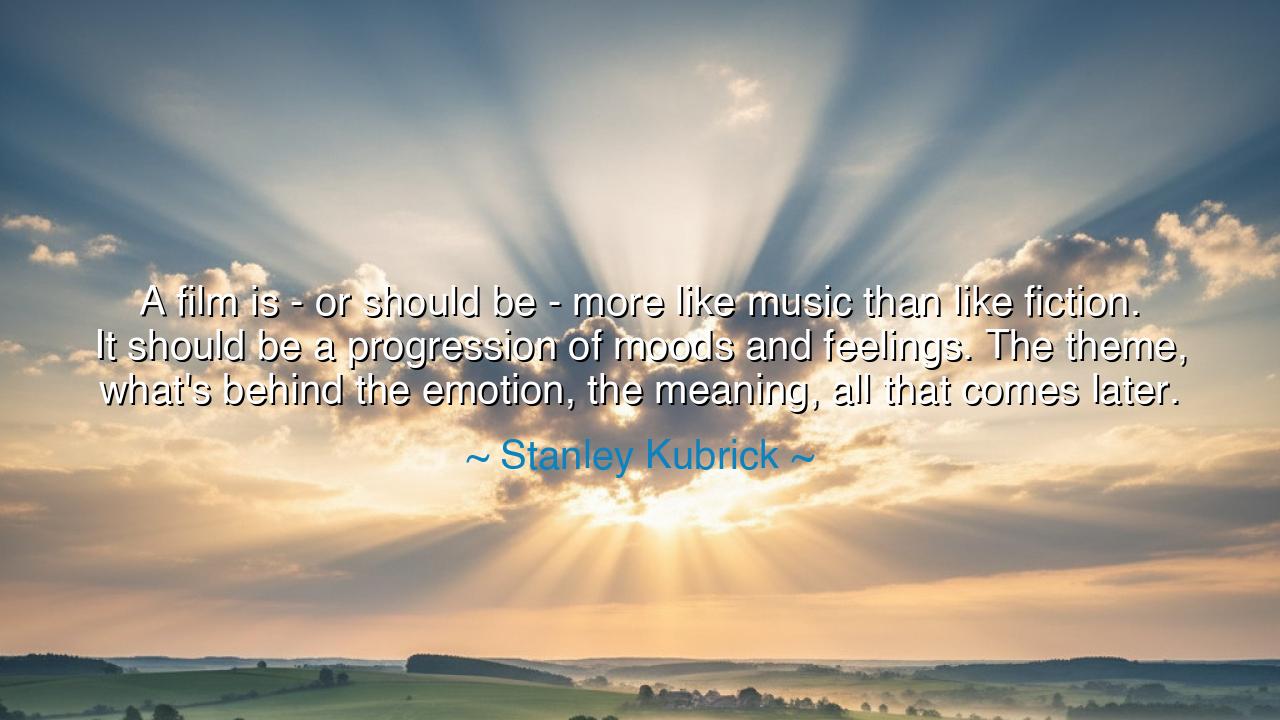
A film is - or should be - more like music than like fiction. It
A film is - or should be - more like music than like fiction. It should be a progression of moods and feelings. The theme, what's behind the emotion, the meaning, all that comes later.






"A film is - or should be - more like music than like fiction. It should be a progression of moods and feelings. The theme, what's behind the emotion, the meaning, all that comes later." — Stanley Kubrick. In these words, the great master of cinema, Stanley Kubrick, reveals the profound nature of film, not as a mere narrative to be told, but as a symphony of the soul. Kubrick speaks of film as an art form that moves beyond the structure of fiction, where plot alone dictates the journey. Instead, he emphasizes that a true film, like music, is an emotional experience—a progression, a flow of moods and feelings that transcend logic and structure. Only after this emotional tapestry unfolds can the deeper meanings, the themes, and the essence of the story be fully understood.
Consider the ancient art of music, which, in the hands of the Greeks, was seen as the language of the gods. Pythagoras himself, the philosopher and mathematician, believed that music was a pathway to understanding the universe. Music speaks not through words, but through tones and rhythms that stir the soul. The melodies of Apollo, the god of music, could move men to tears or to great joy, without a single word being spoken. In much the same way, Kubrick suggests, film is not merely a sequence of events, but a language of emotion, unfolding in a way that touches the spirit before the mind. Through the progression of moods, a film communicates truths that words and logic alone cannot.
This concept is not new to the human experience. The great tragic poets of ancient Greece, like Sophocles, understood that the emotional journey of the audience was paramount. Take Oedipus Rex, where the audience is not merely following a plot, but is carried through a storm of emotions—pride, fear, guilt, and ultimately, catharsis. The meaning of the tragedy, the revelations about fate and free will, are revealed not through intellectual analysis, but through the visceral emotional journey of the characters. The meaning, as Kubrick says, comes later—first, the emotions must stir, and only after that can the theme reveal itself, deep and powerful.
In the realm of cinema, consider Kubrick’s own films, where the visuals and the music are as much a part of the story as the dialogue. In 2001: A Space Odyssey, the iconic score of Strauss’ Blue Danube sets the stage for a journey into the unknown, not with words, but with the grand sweeping emotions of the music. As the film unfolds, it is not simply the narrative of a man lost in space that captivates us; it is the mood created by the music and images, which resonate with something deeper within the viewer. Kubrick knew that meaning would follow, but first, the emotions must be stirred, and the feelings must have time to settle into the consciousness of the audience.
The ancient philosophers also understood the power of mood to influence the mind and the heart. Aristotle, in his Poetics, explained that tragedy—the form of storytelling that most closely resembles the emotional journey of film—was not to be understood in terms of a simple plot, but through the arousal of pity and fear in the audience. The plot is but the vessel that carries the emotional force; the emotion is the true power. In the same vein, Kubrick suggests that film should not be bound by the constraints of conventional narrative. Instead, it should flow like music, a dynamic expression of the human experience that resonates on a deeper, almost subconscious level.
Let us take the lesson of Kubrick to heart. In our own lives, we often seek to impose structure and order on the world around us, much like the fictional stories we are accustomed to hearing. But life, in its essence, is not merely a sequence of events with a clear beginning, middle, and end. Life is a progression of moods, of feelings that ebb and flow, much like a symphony. We must learn to experience life not as a structured narrative, but as a fluid journey of emotion and sensation. The meaning of life, the purpose, does not always come in a linear form, but in the moments where we allow ourselves to feel, to be moved by the rhythm of our experiences.
The lesson here is clear: just as Kubrick saw the potential for film to be more than a story, we must also see the potential for life to be more than a series of events. Life itself is a progression of feelings, of changes in mood, and it is only through embracing this flow that we can truly experience its depth. The meaning of our existence often reveals itself not through rigid logic, but through the emotions we encounter and the moments that stir us deeply. Let us not always seek to understand the order of things, but instead allow ourselves to be carried by the moods of life, knowing that, in time, the theme will emerge.
So, as we face our daily challenges, let us remember the wisdom of Kubrick and the ancient philosophers who came before him. Embrace the flow of emotions, recognize that life is a progression of moods, and trust that the meaning will come—not in the clarity of a plot, but in the richness of the feelings that we experience along the way. Let the music of life play its course, and allow the deeper truths to be revealed when we are ready to understand them. In this way, we will truly live the journey that is our own.






AAdministratorAdministrator
Welcome, honored guests. Please leave a comment, we will respond soon